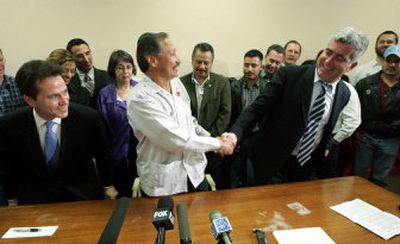UFW, recruiter sign labor pact

YAKIMA – The United Farm Workers of America and one of the nation’s largest labor recruiters have reached an unprecedented labor agreement to improve wages, benefits and working conditions for guest workers brought to the United States for farm work.
The agreement follows months of heated UFW criticism of the company, Los Angeles-based Global Horizons, over working conditions and wages for guest workers. Global Horizons is one of the nation’s largest labor recruiters, bringing foreign workers to the United States under the federal H-2A guest-worker program.
The program allows a labor contractor to bring in foreign workers if it can prove workers can’t be found locally.
“This is the first national agreement that we’re aware of that’s ever dealt with H-2A workers or guest workers in this country,” Arturo Rodriguez, UFW president, said Tuesday in a telephone interview from Seattle, where the union and Global Horizons formally announced the pact.
“To be able to have the opportunity to provide these workers representation, we’re just very excited about that,” Rodriguez said.
Under the agreement, workers will receive a 2 percent pay raise over the federally mandated Adverse Effect Wage Rate, the minimum wage rates employers must pay under the H-2A program. The rates are established by states and are generally higher than the state and federal minimum wage. In Washington state, that rate is $9.01 per hour.
Employers will be required to pay for medical care while the workers are in the United States and provide work breaks. Workers also will receive paid bereavement leave when a family member dies and paid round-trip transportation to their country of origin.
At any one time, Global Horizons has between 3,000 and 4,000 farm workers in up to 28 states, said Mordechai Orian, president of Global Horizons. That number is expected to increase as more farmers face a growing worker shortage.
The union will represent all of those workers.
“There’s a lot of protections created here to protect local labor, as well as labor coming from overseas,” Orian said in a telephone interview. “And it’s a step to ensure we keep the farm industry in the United States.”
His company has faced heated criticism in recent years from both labor groups and state officials in central Washington’s Yakima Valley, an agricultural hub known for its apples, cherries, wine grapes and other crops and an area where growers have complained about a labor shortage in recent years.
Global Horizons has brought more than 100 temporary agricultural workers from Thailand to the valley each of the past two summers under the guest-worker program. However, the state Department of Labor and Industries and Employment Security Department repeatedly accused the company of violating state wage and labor laws.
The state revoked the company’s operating license in December, but the company has appealed.
The new agreement does not affect Global Horizons’ status. The company’s license remains revoked, said Steve Pierce, spokesman for the Labor and Industries Department.
Hearings for the appeal are scheduled to begin in September, he said, making it unlikely the company will be able to bring guest workers to Washington state this summer.
In addition, three Yakima Valley farm workers have sued the company and two local growers in federal court, alleging they illegally displaced them with workers from Thailand.
Global Horizons already has received orders for 3,000 workers in Washington state this summer alone, Orian said. Company officials will be negotiating with Gov. Chris Gregoire to reinstate the company’s license in time for summer, he said.
“All the farmers are just in desperate need. Everybody’s in panic mode. There’s just no labor,” Orian said. “They’re waiting for us to get back our license.”
Erik Nicholson, Pacific Northwest regional director for the UFW, said the union would assist Global Horizons in that effort.
“Ultimately, what this is about is looking at the best interests of both agricultural employers and workers,” he said. “So, while we spent 2 1/2 years fighting, we’re now looking to build the agricultural economy in this region and around the country.”